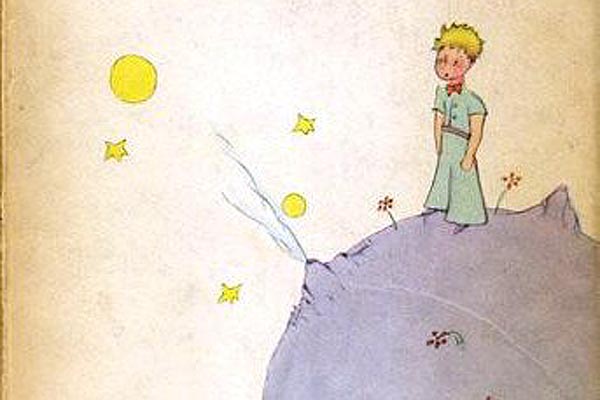 |
| The Little Prince on his asteroid (Wikipedia) |
Note: An aviator downed in the Sahara learns lessons about what's important from a little boy visiting from Asteroid B 612.
Get Ready: Which do you think are more important: the things we can see, or the things we can't? Why do you think so?
In Antoine de Saint-Exupery's The Little Prince, an aviator is forced to make an emergency landing in the Sahara Desert, where a mysterious golden-haired little boy--a "prince"--appears.
Although the man has almost no food or water, the boy asks him to draw a sheep. But the man can't, so he draws what looks like a hat. The boy correctly identifies it as a snake that has swallowed an elephant, but nevertheless, he is not satisfied: he wants a sheep. At last the man draws a box with air holes, and he and the boy agree that the sheep is inside.
The boy is full of questions, and will not let go until they're answered. Over the next eight days, the man and boy get to know each other. The boys tells of the tiny asteroid he comes from--"B 612"--which has three tiny volcanoes, a rose, and a baobab tree. He is visiting other planets to learn about other people, animals, and plants--but he's worried about his rose. He wants a sheep to keep the baobabs from overrunning his little planet.
He has visited six other asteroids, each inhabited by an absurd adult. One was an arrogant king with no subjects. Another was a narcissist who thought everyone (on his empty planet) admired him. A drunkard drank to forget the shame of drinking. A businessman counted the stars so he could "own" them, but was blind to their beauty. A lamplighter's planet was so small that the full day lasted only a minute; nevertheless, he lit and extinguished his lamp every thirty seconds. Another was a geographer who had never traveled anywhere. Each of these is a critique of some aspect of society: government, social standing, materialism, etc.
The prince meets a fox, who teaches him that "Only with the heart can one see rightly. What is essential is invisible to the eye." He also says that we are responsible for the people and things we love (we "tame" each other), and that too often we ignore the most important things and focus on the inconsequential. The boy thus decides to return home to his rose.
He will do so by allowing a yellow snake to bite him--that is, he will die. In fact both he and the pilot are already dying of hunger and thirst, but they are saved when the boy finds a well of sweet water. The little prince says he will be leaving the next day, but not to worry if he appears to be dead: he will leave his heavy body behind when he returns to his planet. Just look to the stars, he says, and you will hear my laughter.
The little prince walks away and the snake bites him, but afterward the pilot cannot find his body. He repairs his plane and returns home, always remembering how love connects us to each other.
--------Read more: https://en.wikipedia.org/wiki/The_Little_Prince
Practice: Match the term to its definition below:
- absurd
- arrogant
- asteroid
- aviator
- baobab
- critique
- extinguished
- inconsequential
- materialism
- narcissist
- not important
- the love of physical objects
- vain, selfish person
- a pilot; a flier
- ridiculous; silly
- a type of large tree
- put out
- overly proud
- a critical comment
- a small celestial object orbiting the sun
Answers are in the first comment below.
Submitted to the Shenzhen Daily for May 25, 2021


Please leave a comment - I can't WAIT to hear from you!